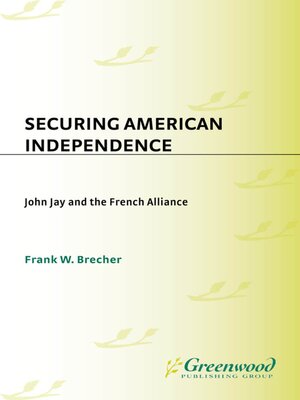Securing American Independence
ebook ∣ John Jay and the French Alliance · Contributions to the Study of World History
By Frank W. Brecher

Sign up to save your library
With an OverDrive account, you can save your favorite libraries for at-a-glance information about availability. Find out more about OverDrive accounts.
Find this title in Libby, the library reading app by OverDrive.



Search for a digital library with this title
Title found at these libraries:
| Loading... |
Brecher explores the controversial diplomacy by which the United States separately brought to a de facto close its War of Independence against the British, leaving its one ally, France, in the lurch. He focuses on the two dominant, ostensibly allied peace negotiators, John Jay and Vergennes.
Veteran diplomat and diplomatic history author Frank Brecher follows the chronology of the American War of Independence, alternating between accounts of the conflict as experienced diplomatically and, in less detail, militarily by the Americans and the French, respectively. In doing so, after summarizing in his preface a highly informed and articulate contemporary analysis of the origins of the Revolution from the perspective of the more conservative elements of the American leadership, of whom John Jay was very much a part, Brecher focuses on the particular experiences of Jay and Vergennes, both in their personal lives and in their politial careers. He describes and compares their respective—and quite different—preparations for their historical activities as peace negotiators, and describes the major developments of the conflict itself as they themselves participated in, and analyzed, them.
While Vergennes, the French Foreign Minister, for the first time in his career, remained physically stationary in Versailles, Jay, for the first time in his life as well as career, left the New York region to live in Philadelphia, then Madrid, and finally Paris, before returning as Secretary for Foreign Affairs in 1784, after four and a half eventful and personally dramatic years abroad. The lessons each of these two diplomats learned as a result of the crucible through which they had to pass before their very personal—and historically important—encounter in France toward war's end very much affected the negotiating strategies they adopted and the ultimatley paradoxical mixture of both triumph and disappoinment with which they helped bring to a succesful conclusion the military phase of an alliance embarked upon by their two nations some five long years earlier. Brecher presents a provocative view of early American diplomacy that will be of interest to scholars and students alike.
Veteran diplomat and diplomatic history author Frank Brecher follows the chronology of the American War of Independence, alternating between accounts of the conflict as experienced diplomatically and, in less detail, militarily by the Americans and the French, respectively. In doing so, after summarizing in his preface a highly informed and articulate contemporary analysis of the origins of the Revolution from the perspective of the more conservative elements of the American leadership, of whom John Jay was very much a part, Brecher focuses on the particular experiences of Jay and Vergennes, both in their personal lives and in their politial careers. He describes and compares their respective—and quite different—preparations for their historical activities as peace negotiators, and describes the major developments of the conflict itself as they themselves participated in, and analyzed, them.
While Vergennes, the French Foreign Minister, for the first time in his career, remained physically stationary in Versailles, Jay, for the first time in his life as well as career, left the New York region to live in Philadelphia, then Madrid, and finally Paris, before returning as Secretary for Foreign Affairs in 1784, after four and a half eventful and personally dramatic years abroad. The lessons each of these two diplomats learned as a result of the crucible through which they had to pass before their very personal—and historically important—encounter in France toward war's end very much affected the negotiating strategies they adopted and the ultimatley paradoxical mixture of both triumph and disappoinment with which they helped bring to a succesful conclusion the military phase of an alliance embarked upon by their two nations some five long years earlier. Brecher presents a provocative view of early American diplomacy that will be of interest to scholars and students alike.






